Alexander Ypsilantis (1792–1828) on:
[Wikipedia]
[Google]
[Amazon]
Alexandros Ypsilantis ( el, Αλέξανδρος Υψηλάντης, Aléxandros Ypsilántis, ; ro, Alexandru Ipsilanti; russian: Александр Константинович Ипсиланти, Aleksandr Konstantinovich Ipsilanti; 12 December 179231 January 1828) was a
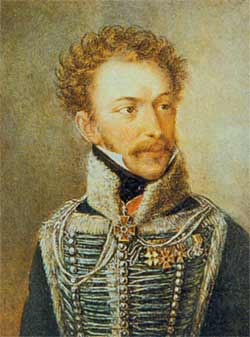 With the outbreak of the
With the outbreak of the 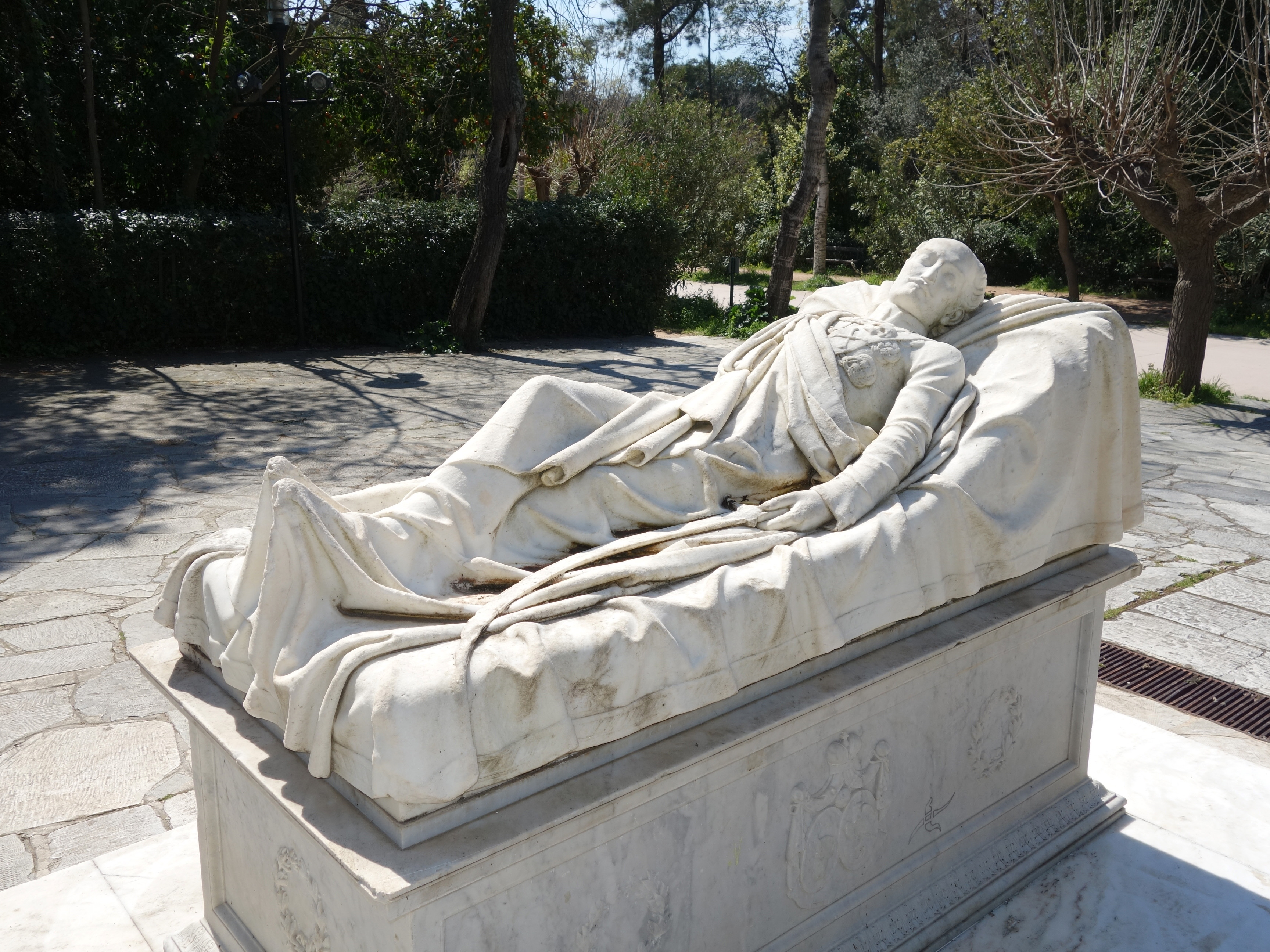 On 12 April 1808, he entered a commission in the prestigious
On 12 April 1808, he entered a commission in the prestigious
 In 1820, on the refusal of Count
In 1820, on the refusal of Count
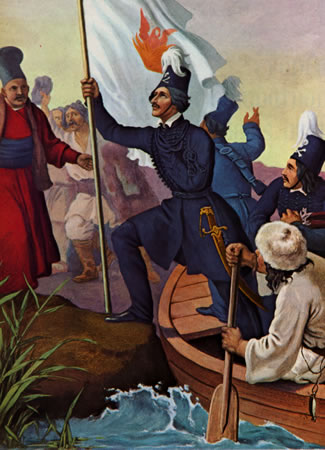 Because information regarding the existence and the activities of the ''Filiki Eteria'' had leaked to the Ottoman authorities, Ypsilantis hastened the outbreak of the revolt in Wallachia and participated personally in it. Beginning the revolution in the
Because information regarding the existence and the activities of the ''Filiki Eteria'' had leaked to the Ottoman authorities, Ypsilantis hastened the outbreak of the revolt in Wallachia and participated personally in it. Beginning the revolution in the  In the meantime, the Ottomans crossed the Danube river with 30,000 tactical troops, and Ypsilantis, instead of advancing on
In the meantime, the Ottomans crossed the Danube river with 30,000 tactical troops, and Ypsilantis, instead of advancing on
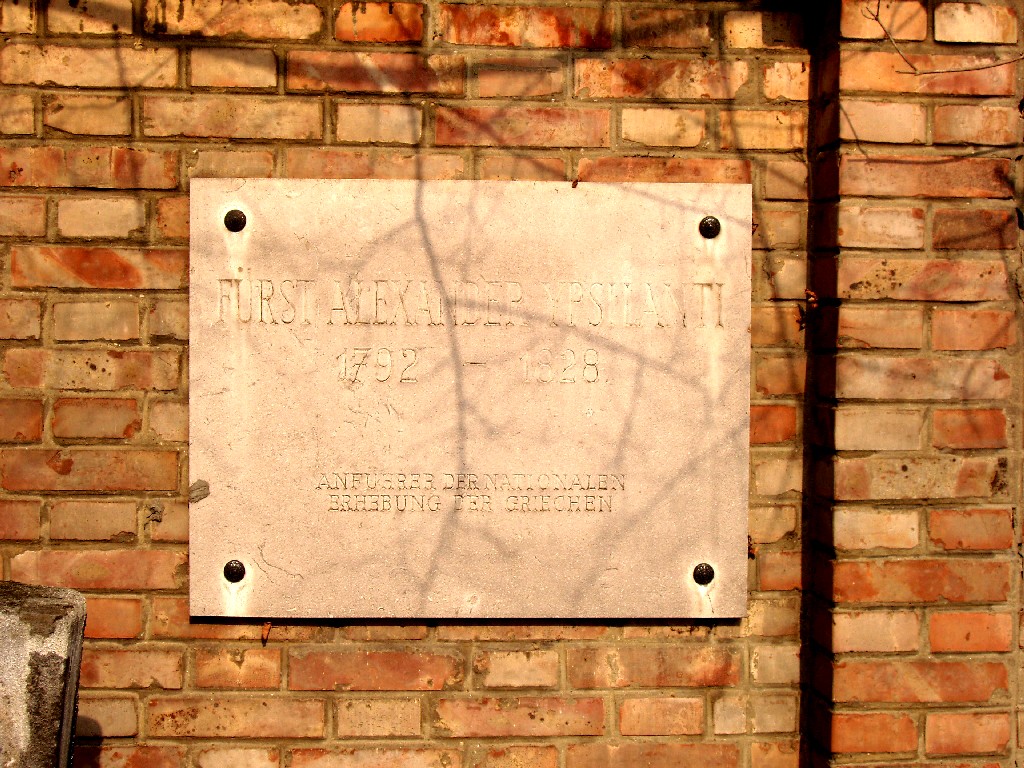
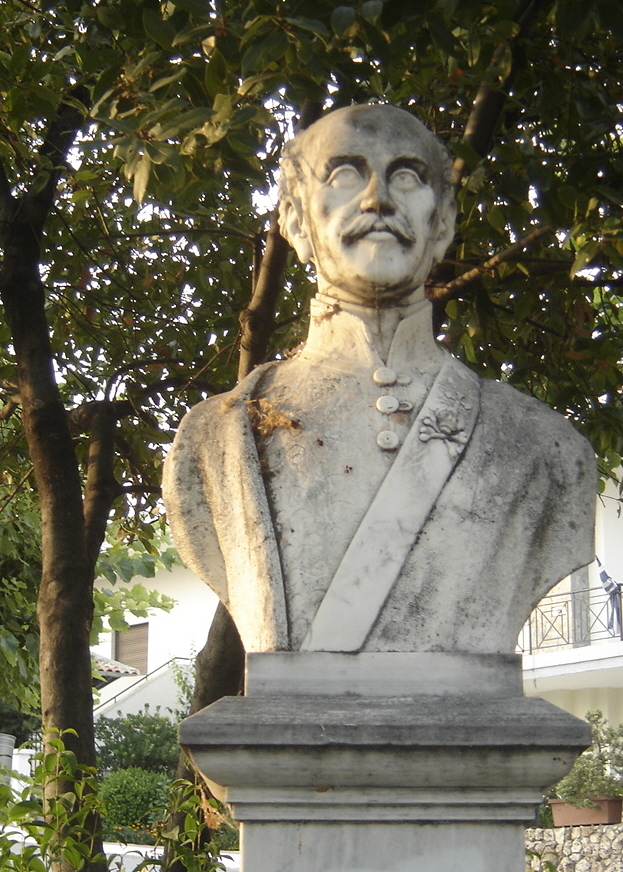 After his release, he retired to
After his release, he retired to
князь Александр Константинович Ипсиланти
* Michalopoulos, Dimitris, ''America, Russia and the Birth of Modern Greece'', Washington-London: Academica Press, 2020, . {{DEFAULTSORT:Ypsilantis, Alexander 1792 births 1828 deaths Greek generals Eastern Orthodox Christians from Greece Russian people of Greek descent Members of the Filiki Eteria Members of Sacred Band (1821) Greek nationalists Imperial Russian Army generals Greek military leaders of the Greek War of Independence People excommunicated by the Greek Orthodox Church Rulers of Moldavia
Greek
Greek may refer to:
Greece
Anything of, from, or related to Greece, a country in Southern Europe:
*Greeks, an ethnic group.
*Greek language, a branch of the Indo-European language family.
**Proto-Greek language, the assumed last common ancestor ...
nationalist politician who was member of a prominent Phanariot Greek family, a prince of the Danubian Principalities
The Danubian Principalities ( ro, Principatele Dunărene, sr, Дунавске кнежевине, translit=Dunavske kneževine) was a conventional name given to the Principalities of Moldavia and Wallachia, which emerged in the early 14th c ...
, a senior officer of the Imperial Russian
The Russian Empire was an empire and the final period of the Russian monarchy from 1721 to 1917, ruling across large parts of Eurasia. It succeeded the Tsardom of Russia following the Treaty of Nystad, which ended the Great Northern War. Th ...
cavalry during the Napoleonic Wars
The Napoleonic Wars (1803–1815) were a series of major global conflicts pitting the French Empire and its allies, led by Napoleon I, against a fluctuating array of European states formed into various coalitions. It produced a period of Fre ...
, and a leader of the Filiki Etaireia, a secret organization that coordinated the beginning of the Greek War of Independence
The Greek War of Independence, also known as the Greek Revolution or the Greek Revolution of 1821, was a successful war of independence by Greek revolutionaries against the Ottoman Empire between 1821 and 1829. The Greeks were later assisted by ...
against the Ottoman Empire
The Ottoman Empire, * ; is an archaic version. The definite article forms and were synonymous * and el, Оθωμανική Αυτοκρατορία, Othōmanikē Avtokratoria, label=none * info page on book at Martin Luther University ...
.
Early life
The Ypsilantis family hailed from thePontic Greek
Pontic Greek ( pnt, Ποντιακόν λαλίαν, or ; el, Ποντιακή διάλεκτος, ; tr, Rumca) is a variety of Modern Greek indigenous to the Pontus region on the southern shores of the Black Sea, northeastern Anatolia, ...
population of Trabzon
Trabzon (; Ancient Greek: Tραπεζοῦς (''Trapezous''), Ophitic Pontic Greek: Τραπεζούντα (''Trapezounta''); Georgian: ტრაპიზონი (''Trapizoni'')), historically known as Trebizond in English, is a city on the B ...
. He was born on 12 December 1792 in Constantinople
la, Constantinopolis ota, قسطنطينيه
, alternate_name = Byzantion (earlier Greek name), Nova Roma ("New Rome"), Miklagard/Miklagarth (Old Norse), Tsargrad ( Slavic), Qustantiniya (Arabic), Basileuousa ("Queen of Cities"), Megalopolis (" ...
, the capital of the Ottoman Empire, as the eldest of five brothers (the others being Demetrios, Nicholas, Georgios and Grigorios). His father Constantine Ypsilantis
Constantine Ypsilantis ( el, Κωνσταντίνος Υψηλάντης ''Konstantinos Ypsilantis''; ro, Constantin Ipsilanti; 1760 – 24 June 1816), was the son of Alexander Ypsilantis, a key member of an important Phanariote family, G ...
and grandfather Alexander
Alexander is a male given name. The most prominent bearer of the name is Alexander the Great, the king of the Ancient Greek kingdom of Macedonia who created one of the largest empires in ancient history.
Variants listed here are Aleksandar, Al ...
were active in the Ottoman administration and highly educated, each with their own share of service as a dragoman in the Sultan's court and as hospodars of the Danubian Principalities
The Danubian Principalities ( ro, Principatele Dunărene, sr, Дунавске кнежевине, translit=Dunavske kneževine) was a conventional name given to the Principalities of Moldavia and Wallachia, which emerged in the early 14th c ...
. His mother, Elisabeta Văcărescu was member of the Văcărescu family.
Russian military service
 With the outbreak of the
With the outbreak of the Russo-Turkish War
The Russo-Turkish wars (or Ottoman–Russian wars) were a series of twelve wars fought between the Russian Empire and the Ottoman Empire between the 16th and 20th centuries. It was one of the longest series of military conflicts in European histo ...
in 1805, his father fled with family to Imperial Russia
The Russian Empire was an empire and the final period of the Russian monarchy from 1721 to 1917, ruling across large parts of Eurasia. It succeeded the Tsardom of Russia following the Treaty of Nystad, which ended the Great Northern War. The ...
. The young Alexander had received a thorough education, becoming fluent in Russian, French, German and Romanian. At the age of 15, he was presented to the Russian Court, where he came under the patronage of Empress Maria Feodorovna.
 On 12 April 1808, he entered a commission in the prestigious
On 12 April 1808, he entered a commission in the prestigious Chevalier Guard
The Chevalier Guard Regiment (russian: Кавалергардский полк, Kavalergardskiy polk) was a Russian heavy cavalry guard regiment, created in 1800 by the reformation of the Chevalier Guard corps, itself created in 1764 by Catheri ...
Regiment with the rank of cornet
The cornet (, ) is a brass instrument similar to the trumpet but distinguished from it by its conical bore, more compact shape, and mellower tone quality. The most common cornet is a transposing instrument in B, though there is also a so ...
. Moving rapidly up the ranks, he was promoted to lieutenant on 27 September 1810 and to Stabs-Rittmeister
__NOTOC__
(German and Scandinavian for "riding master" or "cavalry master") is or was a military rank of a commissioned cavalry officer in the armies of Germany, Austria-Hungary, Scandinavia, and some other countries. A ''Rittmeister'' is typic ...
on 18 October of the same year. During the French invasion of Russia
The French invasion of Russia, also known as the Russian campaign, the Second Polish War, the Army of Twenty nations, and the Patriotic War of 1812 was launched by Napoleon Bonaparte to force the Russian Empire back into the continental block ...
, he fought in the battles of Klyastitsy and Polotsk
Polotsk (russian: По́лоцк; be, По́лацк, translit=Polatsk (BGN/PCGN), Polack (official transliteration); lt, Polockas; pl, Połock) is a historical city in Belarus, situated on the Dvina River. It is the center of the Polotsk Dist ...
. Promoted to full Rittmeister (captain) on 20 February 1813, he went on to participate in the Battle of Bautzen. On 6 July, he was transferred to the Grodno Hussar Regiment as lieutenant colonel, and participated with his new unit in the Battle of Dresden
The Battle of Dresden (26–27 August 1813) was a major engagement of the Napoleonic Wars. The battle took place around the city of Dresden in modern-day Germany. With the recent addition of Austria, the Sixth Coalition felt emboldened in ...
, where his right arm was torn off by a shell.
Although he was immediately promoted to full colonel, it meant that Ypsilantis would not be able to see action again. However, he attended the Congress of Vienna
The Congress of Vienna (, ) of 1814–1815 was a series of international diplomatic meetings to discuss and agree upon a possible new layout of the European political and constitutional order after the downfall of the French Emperor Napoleon ...
, where he was a popular figure in society (see Auguste Louis Charles La Garde de Chambonas, ''Souvenirs''), and earned the sympathy of Tsar Alexander I Alexander I may refer to:
* Alexander I of Macedon, king of Macedon 495–454 BC
* Alexander I of Epirus (370–331 BC), king of Epirus
* Pope Alexander I (died 115), early bishop of Rome
* Pope Alexander I of Alexandria (died 320s), patriarch of A ...
, who appointed him his aide-de-camp on 1 January 1816. In late 1817, at the age of 25, he became a major general
Major general (abbreviated MG, maj. gen. and similar) is a military rank used in many countries. It is derived from the older rank of sergeant major general. The disappearance of the "sergeant" in the title explains the apparent confusion of ...
and commander of the 1st Brigade
A brigade is a major tactical military formation that typically comprises three to six battalions plus supporting elements. It is roughly equivalent to an enlarged or reinforced regiment. Two or more brigades may constitute a division.
...
of Hussars
A hussar ( , ; hu, huszár, pl, husarz, sh, husar / ) was a member of a class of light cavalry, originating in Central Europe during the 15th and 16th centuries. The title and distinctive dress of these horsemen were subsequently widely a ...
of the 1st Hussar Division.
Preparations for the Greek insurrection
 In 1820, on the refusal of Count
In 1820, on the refusal of Count Ioannis Kapodistrias
Count Ioannis Antonios Kapodistrias (10 or 11 February 1776 – 9 October 1831), sometimes anglicized as John Capodistrias ( el, Κόμης Ιωάννης Αντώνιος Καποδίστριας, Komis Ioannis Antonios Kapodistrias; russian: � ...
, the Russian foreign minister, to accept the post of leader of the Filiki Eteria
Filiki Eteria or Society of Friends ( el, Φιλικὴ Ἑταιρεία ''or'' ) was a secret organization founded in 1814 in Odessa, whose purpose was to overthrow the Ottoman rule of Greece and establish an independent Greek state. (''ret ...
, the post was offered to Ypsilantis, who was then elected as the leader of the secret society. Following that, he processed and approved the general plan of the Greek war of Independence, which was revised during May 1820 at Bucharest
Bucharest ( , ; ro, București ) is the capital and largest city of Romania, as well as its cultural, industrial, and financial centre. It is located in the southeast of the country, on the banks of the Dâmbovița River, less than north o ...
, with the participation of rebel captains from mainland Greece.
The main points of the plan were:
* to aid the simultaneous revolt of Serbs
The Serbs ( sr-Cyr, Срби, Srbi, ) are the most numerous South Slavs, South Slavic ethnic group native to the Balkans in Southeastern Europe, who share a common Serbian Cultural heritage, ancestry, Culture of Serbia, culture, History of ...
and Montenegrins
Montenegrins ( cnr, Црногорци, Crnogorci, or ; lit. "Black Mountain People") are a South Slavic ethnic group that share a common Montenegrin culture, history, and language, identified with the country of Montenegro.
Genetics
Accordi ...
.
* to provoke a revolt in Wallachia, by also enlisting rebels from the Serbian lands, battle-hardened from the first and second
The second (symbol: s) is the unit of time in the International System of Units (SI), historically defined as of a day – this factor derived from the division of the day first into 24 hours, then to 60 minutes and finally to 60 seconds ea ...
Serbian uprisings.
* to provoke civil unrest in Constantinople through the use of agents, and burn the Ottoman fleet at the city's port.
* to start the revolution in Greece in the Peloponnese
The Peloponnese (), Peloponnesus (; el, Πελοπόννησος, Pelopónnēsos,(), or Morea is a peninsula and geographic region in southern Greece. It is connected to the central part of the country by the Isthmus of Corinth land bridge which ...
, after Ypsilantis' arrival there.
Ypsilantis issued a declaration on 8 October 1820, announcing that he would soon be starting a revolt against the Ottoman Empire. Ypsilantis began his declaration by praising ancient Greece, writing: "Cast your eyes toward the seas, which are covered by our seafaring cousins, ready to follow the example of Salamis. Look to the land, and everywhere you will see Leonidas
Leonidas I (; grc-gre, Λεωνίδας; died 19 September 480 BC) was a List of kings of Sparta#Heraclids, king of the Greek city-state of Sparta, and the 17th of the List of kings of Sparta#Agiad dynasty, Agiad line, a dynasty which claimed d ...
at the head of the patriotic Sparta
Sparta ( Doric Greek: Σπάρτα, ''Spártā''; Attic Greek: Σπάρτη, ''Spártē'') was a prominent city-state in Laconia, in ancient Greece. In antiquity, the city-state was known as Lacedaemon (, ), while the name Sparta referr ...
ns". Ypsilantis went on to say that the Greeks did not need foreign help as they could defeat the Turks on their own before going on to say that Russian support was assured.
Campaign in Moldavia and Wallachia
 Because information regarding the existence and the activities of the ''Filiki Eteria'' had leaked to the Ottoman authorities, Ypsilantis hastened the outbreak of the revolt in Wallachia and participated personally in it. Beginning the revolution in the
Because information regarding the existence and the activities of the ''Filiki Eteria'' had leaked to the Ottoman authorities, Ypsilantis hastened the outbreak of the revolt in Wallachia and participated personally in it. Beginning the revolution in the Danubian Principalities
The Danubian Principalities ( ro, Principatele Dunărene, sr, Дунавске кнежевине, translit=Dunavske kneževine) was a conventional name given to the Principalities of Moldavia and Wallachia, which emerged in the early 14th c ...
had the added benefit that they, being autonomous under the joint suzerainty of Russia and the Ottoman Empire, did not have Ottoman garrisons, while in turn the local leaders were entitled to maintain small armed retinues for their own protection. Legally, the Ottomans could not move their forces into Wallachia
Wallachia or Walachia (; ro, Țara Românească, lit=The Romanian Land' or 'The Romanian Country, ; archaic: ', Romanian Cyrillic alphabet: ) is a historical and geographical region of Romania. It is situated north of the Lower Danube and s ...
or Moldavia
Moldavia ( ro, Moldova, or , literally "The Country of Moldavia"; in Romanian Cyrillic: or ; chu, Землѧ Молдавскаѧ; el, Ἡγεμονία τῆς Μολδαβίας) is a historical region and former principality in Centr ...
without Russia's permission, and if the Ottomans sent their forces in unilaterally, Russia might go to war. The Prince of Moldavia, Michael Soutsos was a Phanariot Greek who was secretly a member of the Philiki Eteria, but at the same time however, Soutsos was an opportunist who hedged his bets by secretly informing the Sublime Porte of the planned invasion. Therefore, on 22 February 1821 (O.S.), accompanied by several other Greek officers in Russian service, Ypsilantis crossed the Prut
The Prut (also spelled in English as Pruth; , uk, Прут) is a long river in Eastern Europe. It is a left tributary of the Danube. In part of its course it forms Romania's border with Moldova and Ukraine.
Characteristics
The Prut originates ...
river at Sculeni
Sculeni ( yi, סקולען, ''Skulen'') is a commune in Ungheni District, Moldova. It is composed of four villages: Blindești, Floreni, Gherman and Sculeni.
It is also a border checkpoint to Romania.
History
The town had an important Jewis ...
into the Principalities. Two days later, at Iaşi he issued a proclamation, announcing that he had "the support of a great power" (meaning Russia).
Ypsilantis hoped that a revolt would ultimately lead to a Russian intervention: since the Ottomans would have to invade and quell the rebellion, the Orthodox Russians would certainly intervene in favour of their fellow Orthodox. In this hope he was justified, since eventually, the Greek rebellion led to the Russo-Turkish War of 1828 in which Russian troops marched to the outskirts of Constantinople and forced the Sultan to recognize the autonomy of the new Greek state. In 1821 however, Tsar Alexander was still a committed member of the Holy Alliance
The Holy Alliance (german: Heilige Allianz; russian: Священный союз, ''Svyashchennyy soyuz''; also called the Grand Alliance) was a coalition linking the monarchist great powers of Austria, Prussia, and Russia. It was created after ...
, and acted swiftly to disassociate himself from Ypsilantis: Count Capodistria denounced Ypsilantis for having misused the Tsar's trust, stripped him of his rank and commanded him to lay down arms. Soon after, Capodistria himself had to take an "indefinite leave of absence" from his post.
These moves emboldened the Turks, who began assembling a large number of troops to quell the insurrection in Wallachia. Ypsilantis marched from Iaşi to Bucharest
Bucharest ( , ; ro, București ) is the capital and largest city of Romania, as well as its cultural, industrial, and financial centre. It is located in the southeast of the country, on the banks of the Dâmbovița River, less than north o ...
, trying to enlist volunteers. Ypsilantis was constantly short of money and his men turned to plundering the region. At Galați
Galați (, , ; also known by other alternative names) is the capital city of Galați County in the historical region of Western Moldavia, in eastern Romania. Galați is a port town on the Danube River. It has been the only port for the most pa ...
, one of Ypsilantis' officers, Vasilios Karavias murdered the local Turkish merchants to raise funds while in Iași the local Ottoman guard of 50 men were killed after surrendering and received promises that their lives would be spared. It was then that the Sacred Band was formed, comprising young Greek volunteers from all over Europe. Ypsilantis advanced slowly, not entering Wallachia until early April, by which time Tudor Vladimirescu had seized Bucharest. A further problem arose when the Patriarch Grigorios placed an anathema on Ypsilantis as an enemy of the Orthodox faith, called on true believers to remain loyal to the Sultan, and denounced Ypsilantis for "a foul, impious and foolish work".
In Bucharest, where he had arrived after some weeks' delay, it became plain that he could not rely on the Wallachian Pandurs
The Pandurs were any of several light infantry military units beginning with Trenck's Pandurs, used by the Kingdom of Hungary from 1741, fighting in the War of the Austrian Succession and the Silesian Wars. Others to follow included Vladimirescu' ...
to continue their Oltenian-based revolt for assistance to the Greek cause; Ypsilantis was met with mistrust by the Pandur leader Tudor Vladimirescu, who, as a nominal ally to the Eteria, had started the rebellion as a move to prevent Scarlat Callimachi from reaching the throne in Bucharest, while trying to maintain relations with both Russia and the Ottomans. More fundamentally, Ypsilantis and other Greek leaders relied on the support of the Romanians, on the base of their common Christian Orthodox faith, and underestimated the increasing resentment of Greek influence in the Principalities during the Phanariote era and the first stirrings of what would become Romanian nationalism.
Further, Vladimirescu regarded the Russian renunciation of Ypsilantis as absolving him from any further commitment to the Filiki Eteria. As a result, a conflict erupted inside his Vladimirescu's camp. In the end, Vladimirescu was summarily tried and put to death by the pro-Greek faction and the Eteria.
Brăila
Brăila (, also , ) is a city in Muntenia, eastern Romania, a port on the Danube and the capital of Brăila County. The Sud-Est (development region), ''Sud-Est'' Regional Development Agency is located in Brăila.
According to the 2011 Romanian ...
, where he arguably could have prevented the Ottoman armies entering the Principalities and might have forced Russia to accept a ''fait accompli
Many words in the English vocabulary are of French origin, most coming from the Anglo-Norman spoken by the upper classes in England for several hundred years after the Norman Conquest, before the language settled into what became Modern Engl ...
'', retreated and organized his defense at a semi-mountainous area close to Iaşi. There followed a series of major battles that led to the defeat of the Eteria's forces, culminating in the final defeat at Drăgăşani on 7 June. After a long march in the rain, Ypsilantis's army was exhausted, but Karavias, who was drunk, led the Sacred Band into a charge against the Ottomans. As the inexperienced and ill-trained men of the Sacred Band did not form squares, which would have allowed them to pack enough firepower together, the Ottoman cavalry had no difficulty in cutting down the rebels.
After the defeat, Ypsilantis fled north. Ypsilantis, in his final declaration to his men, refused to accept responsibility for his failure and blamed his men for all his failures, writing: "Soldiers! No! I will no longer pollute that sacred and honourable name by applying it to you. You are a cowardly rabble!...You have broken your oaths, you have betrayed God and your country, you have betrayed me too at the moment when I hoped either to conquer or to die with honor among you...Run off to the Turks, who alone are worthy of your support...run off to the Turks, and kiss their hands from which still drips the blood of those they have inhumanely slaughtered. Yes! Run off to them, buy slavery with your lives and with the honor of your wives and children!"Ypsilantis's army booed him when he read out this declaration.
Refuge
Ypsilantis, accompanied by what remained of his followers, retreated toRâmnic
The Râmnic is a left tributary of the river Casimcea in Romania
Romania ( ; ro, România ) is a country located at the crossroads of Central, Eastern, and Southeastern Europe. It borders Bulgaria to the south, Ukraine to the north, Hu ...
, where he spent some days in negotiating with the Austrian
Austrian may refer to:
* Austrians, someone from Austria or of Austrian descent
** Someone who is considered an Austrian citizen, see Austrian nationality law
* Austrian German dialect
* Something associated with the country Austria, for example: ...
authorities for permission to cross the frontier. Fearing that his defeated followers might surrender him to the Turks, he gave out that Austria had declared war on Turkey, caused a ''Te Deum
The "Te Deum" (, ; from its incipit, , ) is a Latin Christian hymn traditionally ascribed to AD 387 authorship, but with antecedents that place it much earlier. It is central to the Ambrosian hymnal, which spread throughout the Latin Ch ...
'' to be sung in the church of Cozia, and, on pretext of arranging measures with the Austrian commander-in-chief, crossed the frontier. But the reactionary
In political science, a reactionary or a reactionist is a person who holds political views that favor a return to the '' status quo ante'', the previous political state of society, which that person believes possessed positive characteristics abs ...
policies of the Holy Alliance
The Holy Alliance (german: Heilige Allianz; russian: Священный союз, ''Svyashchennyy soyuz''; also called the Grand Alliance) was a coalition linking the monarchist great powers of Austria, Prussia, and Russia. It was created after ...
were enforced by Francis I Francis I or Francis the First may refer to:
* Francesco I Gonzaga (1366–1407)
* Francis I, Duke of Brittany (1414–1450), reigned 1442–1450
* Francis I of France (1494–1547), King of France, reigned 1515–1547
* Francis I, Duke of Saxe-Lau ...
and Klemens Metternich, and the country refused to give asylum for leaders of revolts in neighboring countries. Ypsilantis was kept in close confinement for seven years (1823 to 1827 in Terezín), until he was released at the insistence of the emperor Nicholas I of Russia
, house = Romanov-Holstein-Gottorp
, father = Paul I of Russia
, mother = Maria Feodorovna (Sophie Dorothea of Württemberg)
, birth_date =
, birth_place = Gatchina Palace, Gatchina, Russian Empire
, death_date ...
.
Death

 After his release, he retired to
After his release, he retired to Vienna
en, Viennese
, iso_code = AT-9
, registration_plate = W
, postal_code_type = Postal code
, postal_code =
, timezone = CET
, utc_offset = +1
, timezone_DST ...
, where he died in extreme poverty and misery on 29 January 1828. His last wish that his heart be removed from his body and sent to Greece
Greece,, or , romanized: ', officially the Hellenic Republic, is a country in Southeast Europe. It is situated on the southern tip of the Balkans, and is located at the crossroads of Europe, Asia, and Africa. Greece shares land borders wi ...
was fulfilled by Georgios Lassanis, and it is now located at the Amalieion in Athens
Athens ( ; el, Αθήνα, Athína ; grc, Ἀθῆναι, Athênai (pl.) ) is both the capital and largest city of Greece. With a population close to four million, it is also the seventh largest city in the European Union. Athens dominates a ...
. His appearance in likenesses and the accounts of his life suggest he had dystrophia myotonica
Myotonic dystrophy (DM) is a type of muscular dystrophy, a group of genetic disorders that cause progressive muscle loss and weakness. In DM, muscles are often myotonia, unable to relax after contraction. Other manifestations may include cataract ...
, a congenital multi-system disorder.See Caughey J. E., ''Dystrophia Myotonica and Related Disorders''. 1991)
His body was originally buried on St. Marx cemetery. Much later, on 18 February 1903, his remains were transferred by members of his family to the Ypsilanti-Sina estate, Schloss Rappoltenkirchen, Sieghartskirchen
Sieghartskirchen is a municipality in the district of Tulln in the Austrian state of Lower Austria
Lower Austria (german: Niederösterreich; Austro-Bavarian: ''Niedaöstareich'', ''Niedaestareich'') is one of the nine states of Austria, located i ...
, Austria. His last transfer occurred in August 1964, when he was finally relocated to the Taxiarches Church Taxiarches or its variant taxiarchos (from el, ταξιάρχης or ταξίαρχος), anglicized taxiarch, may refer to:
* Taxiarch, equivalent to brigadier in ancient and modern Greek military terminology
* Archangels Michael and Gabriel are ...
in Pedion tou Areos, Athens, Greece, 136 years after his death.
Ypsilanti Township, Michigan, in the United States, is named in honor of him. Later the city of Ypsilanti, located within the township, was named after his brother Demetrius.
Cultural references
Alexander Ypsilantis is mentioned in Russian literature byAlexander Pushkin
Alexander Sergeyevich Pushkin (; rus, links=no, Александр Сергеевич ПушкинIn pre-Revolutionary script, his name was written ., r=Aleksandr Sergeyevich Pushkin, p=ɐlʲɪkˈsandr sʲɪrˈɡʲe(j)ɪvʲɪtɕ ˈpuʂkʲɪn, ...
in his short story "The Shot
The Shot was a basketball play that occurred during a 1989 playoff game between the Chicago Bulls and Cleveland Cavaliers of the National Basketball Association (NBA). It took place on May 7, 1989 at Richfield Coliseum in Richfield Township, ...
". The hero of Pushkin's story, Silvio, dies in a campaign under command of Ypsilantis.
See also
*Alexander Ypsilantis (1725–1805)
Alexander Ypsilantis ( el, Αλέξανδρος Υψηλάντης ''Alexandros Ypsilantis'', ro, Alexandru Ipsilanti; 1726 – 13 January 1807) was a Greek Voivode (Prince) of Wallachia from 1774 to 1782, and again from 1796 to 1797, and also ...
– grandfather
*Constantine Ypsilantis
Constantine Ypsilantis ( el, Κωνσταντίνος Υψηλάντης ''Konstantinos Ypsilantis''; ro, Constantin Ipsilanti; 1760 – 24 June 1816), was the son of Alexander Ypsilantis, a key member of an important Phanariote family, G ...
– father
*Demetrios Ypsilantis
Demetrios Ypsilantis (alternatively spelled Demetrius Ypsilanti; el, Δημήτριος Υψηλάντης, ; ro, Dumitru Ipsilanti; 1793August 16, 1832) was a Greek army officer who served in both the Hellenic Army and the Imperial Russian ...
– brother
References
Sources
* * *князь Александр Константинович Ипсиланти
* Michalopoulos, Dimitris, ''America, Russia and the Birth of Modern Greece'', Washington-London: Academica Press, 2020, . {{DEFAULTSORT:Ypsilantis, Alexander 1792 births 1828 deaths Greek generals Eastern Orthodox Christians from Greece Russian people of Greek descent Members of the Filiki Eteria Members of Sacred Band (1821) Greek nationalists Imperial Russian Army generals Greek military leaders of the Greek War of Independence People excommunicated by the Greek Orthodox Church Rulers of Moldavia
Alexander
Alexander is a male given name. The most prominent bearer of the name is Alexander the Great, the king of the Ancient Greek kingdom of Macedonia who created one of the largest empires in ancient history.
Variants listed here are Aleksandar, Al ...
Politicians from Istanbul
Russian military personnel of the Napoleonic Wars
Greek amputees
Constantinopolitan Greeks
Greek independence activists
Military personnel from Istanbul